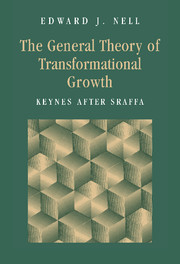Book contents
- Frontmatter
- Contents
- Preface
- Acknowledgments
- Part I History or equilibrium?
- Part II Method and approach: the active mind
- Part III Money and the Golden Rule
- PART IV The wage-profit trade-off
- Part V Investment and Mass Production
- 10 Demand growth, pricing, and investment plans
- 11 Inflation, employment, and market adjustment in Mass Production
- Part VI Money and fluctuations in the modern economy
- Conclusions
- Bibliography
- Index
11 - Inflation, employment, and market adjustment in Mass Production
Published online by Cambridge University Press: 21 January 2010
- Frontmatter
- Contents
- Preface
- Acknowledgments
- Part I History or equilibrium?
- Part II Method and approach: the active mind
- Part III Money and the Golden Rule
- PART IV The wage-profit trade-off
- Part V Investment and Mass Production
- 10 Demand growth, pricing, and investment plans
- 11 Inflation, employment, and market adjustment in Mass Production
- Part VI Money and fluctuations in the modern economy
- Conclusions
- Bibliography
- Index
Summary
Prices are determined along with investment plans. But plans still have to be executed, and the timing and extent of execution depends on current variables, especially effective demand and interest rates, a point that will be explored later. But such changes in timing and execution also affect current variables – in the aggregate, demand changes tend to cause further demand changes. In Craft economies such variations in carrying out plans will normally lead to price changes and gravitational adjustments. These effects tend to be movements in the opposite direction to the initial change, and tend to stabilize the system, disposing it to converge on the normal position, as explored in Chapters 8 and 9. But in Mass Production prices will tend to be steady over a wide range of variation. Instead quantities – output and employment – will adjust, but the pattern of changes set in motion will move in the same direction as the initial change; so the adjustments will tend to be destabilizing rather than stabilizing. The differences in the way Craft and Mass Production markets adjust have implications for almost every aspect of the system – and also for theory. Starting from the implications for the idea of equilibrium, we will examine consumption, investment, labor, productivity, and inflation, ending up with a look at a contrasting way to operate a Mass Production system: socialism.
- Type
- Chapter
- Information
- The General Theory of Transformational GrowthKeynes after Sraffa, pp. 545 - 610Publisher: Cambridge University PressPrint publication year: 1998



